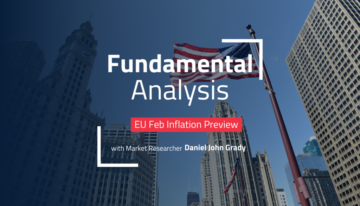The consensus is solidifying around an expectation that the ECB will hike by 25bps at the upcoming meeting, and signal that more hikes could be coming. The latest inflation data was in line with expectations and didn’t change the outlook for what the shared central bank might do. About 80% of analysts expect a quarter of a point hike, while the remainder expect a 50bps hike.
This would be the seventh consecutive hike for the ECB, but the effect on the Euro might be somewhat muted. Its peers are all expected to raise a similar amount, equalizing the interest rate gap between them. With the Fed expected to pause going forward, while the BOE might be forced to keep raising, a lot of focus will be on the ECB’s outlook.
The widening gap
As interest rates rise, the gap has been widening between the views of the “north” and “south” nations on the Monetary Policy Committee. Hawks have been pointing to persistently high inflation, while doves are pointing to persistently sluggish economic growth.
Last time around, the differences between these two camps were put aside to deal with the recent collapse of Credit Suisse. Everyone agreed on the need to send a message of calm to the markets, and confidence in the banking system. That situation isn’t exactly repeating this time around. Yes, there was a recent bank collapse in the US – the second largest in the country’s history – but the ECB insists that Europe’s situation is much different.
The baseline scenario
The ECB has a couple of issues to deal with beyond strictly the price of goods and services. Europe’s economy is highly reliant on trade; European industry is export-oriented and dependent on the value of the Euro. European consumers buy imported goods, including foodstuffs, and raw materials, which has strong implications for inflation.
With the Fed expected to ease off on hikes, the Euro could get substantially stronger if the ECB keeps up the tightening and inflation keeps coming down. This would be potentially disastrous for European industry, which is already facing increased costs from energy. Overtightening can quickly put the ECB back into the very uncomfortable position it was in before covid: persistently low inflation and low growth.
Who will win out?
So far, the number of ECB members who have expressed concern about inflation have far outweighed the number talking about growth. But, the Eurozone managed to escape a recession by the bare minimum last year. Southern nations have growing piles of debt which are accelerating in size due to higher interest rates.
At the moment, the hiking consensus includes several members who are from the “south”, such as Slovenia’s Vasle and Croatia’s Vujcic. Even Italy’s Visco has been positive on controlling inflation. That consensus could reverse rather quickly if economic growth turns negative, and threatens a deflationary spiral that would leave the south in a much more vulnerable position.
If Lagarde is seen as softening her tone on inflation, it could provide some weakness for the Euro. Meanwhile, it’s hard to see how Lagarde could be any more hawkish after repeatedly saying inflation is too high, and is expected to be that way for too long.
Trading the news requires access to extensive market research – and that’s what we do best.
- SEO Powered Content & PR Distribution. Get Amplified Today.
- PlatoAiStream. Web3 Data Intelligence. Knowledge Amplified. Access Here.
- Minting the Future w Adryenn Ashley. Access Here.
- Source: https://www.orbex.com/blog/en/2023/05/ecb-expected-to-hike-at-least-25bps
- :has
- :is
- $UP
- 50bps
- a
- About
- accelerating
- access
- After
- All
- already
- amount
- an
- Analysts
- and
- any
- ARE
- around
- AS
- At
- back
- Bank
- Banking
- banking system
- Baseline
- BE
- been
- before
- BEST
- between
- Beyond
- BoE
- but
- buy
- by
- CAN
- central
- Central Bank
- change
- Collapse
- coming
- committee
- Concern
- confidence
- consecutive
- Consensus
- Consumers
- controlling
- Costs
- could
- country’s
- Couple
- Covid
- credit
- credit suisse
- data
- deal
- Debt
- deflationary
- dependent
- differences
- different
- disastrous
- do
- down
- due
- ease
- ECB
- Economic
- Economic growth
- economy
- effect
- energy
- escape
- Ether (ETH)
- Euro
- European
- Europes
- Eurozone
- Even
- everyone
- exactly
- expect
- expectation
- expectations
- expected
- expressed
- extensive
- facing
- far
- Fed
- Focus
- For
- forced
- Forward
- from
- gap
- get
- going
- goods
- Growing
- Growth
- Hard
- Have
- Hawkish
- her
- High
- High inflation
- higher
- highly
- Hike
- Hikes
- hiking
- history
- How
- HTTPS
- if
- image
- implications
- in
- includes
- Including
- increased
- industry
- inflation
- interest
- INTEREST RATE
- Interest Rates
- into
- issues
- IT
- ITS
- Keep
- Lagarde
- largest
- Last
- Last Year
- latest
- least
- Leave
- Line
- live
- Long
- Lot
- Low
- managed
- Market
- market research
- Markets
- Masterclass
- materials
- Meanwhile
- meeting
- Members
- message
- might
- minimum
- moment
- Monetary
- Monetary Policy
- monetary policy committee
- more
- much
- Nations
- Need
- negative
- news
- number
- of
- off
- on
- out
- Outlook
- persistently
- plato
- Plato Data Intelligence
- PlatoData
- Point
- policy
- position
- positive
- potentially
- price
- provide
- put
- Quarter
- quickly
- raise
- raising
- Rate
- Rates
- rather
- Raw
- recent
- recession
- REPEATEDLY
- requires
- research
- reverse
- Rise
- s
- saying
- Second
- see
- seen
- send
- Services
- several
- shared
- Signal
- similar
- situation
- Size
- sluggish
- some
- somewhat
- South
- Southern
- strong
- stronger
- such
- Suisse
- system
- talking
- that
- The
- the Fed
- Them
- There.
- These
- this
- threatens
- tightening
- time
- to
- TONE
- too
- trade
- two
- upcoming
- URL
- us
- value
- very
- views
- Vulnerable
- was
- Way..
- we
- weakness
- were
- What
- which
- while
- WHO
- will
- win
- with
- would
- X
- year
- zephyrnet

![Masterclass 728 x 90 [EN]](https://platoaistream.net/wp-content/uploads/2023/05/ecb-expected-to-hike-at-least-25bps.png)








